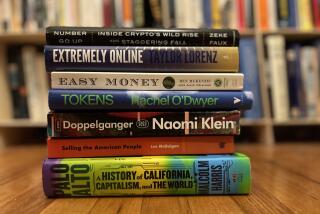How do we love/hate Steve Jobs? Let us count the ways
- Share via
The death of Steve Jobs at the age of 56 in 2010 triggered an unusually high emotional response from people — especially for a CEO. The reaction over the loss of the creative soul of Apple Inc. was more like what we would expect to see for a pop star than a titan of industry.
The release this weekend of “Steve Jobs: The Man in the Machine,” Alex Gibney’s documentary portrait, is the latest attempt to make sense of the intensity of interest in the man who delivered the Macintosh and a series of culture-shifting iGadgets.
As Gibney told Molly Wood of public radio’s Marketplace, “One of the reasons we wept was that [Jobs] was our guide in this journey to become more intimate with our machines, particularly our computers.” Focusing on some of Jobs’ more unsavory traits, the film illuminates the conundrum of our obsession with the man.
SIGN UP for the free Indie Focus movies newsletter >>
Beyond Jobs’ role as a tech evangelist, his ability to charm, disarm and cajole both rivals and acolytes created an almost Shakespearean aura around his death. Was he a ruthless despot or a contemplative visionary? Did the purported genius justify the arrogance?
Almost five years later, this fascination continues unabated. How do we love/hate Steve Jobs? Let us count the ways.
Iconographic Steve
The first major book project to land following his death was Walter Isaacson’s biography “Steve Jobs,” published in 2011. Writing at Jobs’ behest, Isaacson was provided unprecedented cooperation, access and freedom. Less hagiographic than many of the books that preceded it, Jobs was reportedly pleased the representation would show him flaws and all, though some of the former had never exactly been hidden.
Earlier this year, current Apple chief Tim Cook and several others connected to the company praised a new bio, “Becoming Steve Jobs: The Evolution of a Reckless Upstart Into a Visionary Leader” by Brent Schlender and Rick Tetzeli, while dismissing the Isaacson book. Though the book cracked best-sellers lists, “Becoming” did not have the cultural impact of Isaacson’s bio.
Outnumbering the myriad biographies is a seemingly endless number of tomes mining Jobs’ business savvy. If you want to do demos like Steve, there’s “The Presentation Secrets of Steve Jobs: How to Be Insanely Great in Front of Any Audience,” while “The Steve Jobs Way: iLeadership for a New Generation” promises insight into Jobs’ Zen-influenced approach to management. Many more titles, some riffing off the phrases “Think Different” and “Insanely Great,” fill the virtual shelves of Amazon and other online booksellers.
Cinematic Steve
Beating both Gibney’s documentary and the adaptation of Isaacson’s book to the big screen was “Jobs,” starring Ashton Kutcher. Written by Matt Whiteley and directed by Joshua Michael Stern, the film earned pre-release buzz for Kutcher’s startling resemblance to a young Jobs. However, after debuting at Sundance in 2013, the film took a critical drubbing and was mostly ignored by audiences upon release.
Arriving later this fall with much higher expectations is “Steve Jobs,” starring Michael Fassbender. Originally optioned by Sony, which hired Aaron Sorkin to adapt Isaacson’s book, the project went through a slew of star-director combinations, notably Christian Bale and David Fincher. Bale dropped out, and Danny Boyle replaced Fincher before the film was put in turnaround. Boyle accompanied Sorkin’s script to Universal, and Fassbender, Seth Rogen and Kate Winslet were ultimately cast.
Viral Steve
If short form is more to your liking, there is plenty of Jobs on the interwebs. Most popular is his 2005 Stanford University commencement address, “Stay Hungry, Stay Foolish,” in which a reflective Jobs imparted how important getting fired from Apple in 1985 had been to his later success. If you want to see a less-guarded Jobs, check out clips of some of his tantrums. There is also a joint interview with Bill Gates at the 2007 D5 Conference, as well as the product introductions for the iPod, the iPhone and the iPad for which he was famous.
Twitter: @Storyspheare
More to Read
Only good movies
Get the Indie Focus newsletter, Mark Olsen's weekly guide to the world of cinema.
You may occasionally receive promotional content from the Los Angeles Times.








